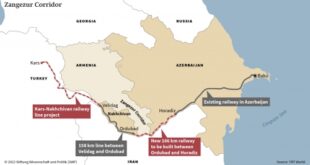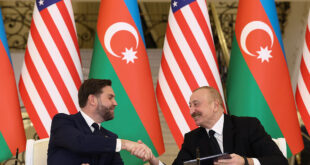 The local authorities reported that the second Georgian unmanned spy plane since Monday, which is the seventh one starting from the beginning of this year, has been shot down in the airspace over Abkhazia.Earlier on Monday Merab Kishmaria, the region’s defense chief, stated that Abkhaz air defenses have shot down sixth Georgia drone in the afternoon. Presidential administration of Abkhazia has also confirmed this report.
The local authorities reported that the second Georgian unmanned spy plane since Monday, which is the seventh one starting from the beginning of this year, has been shot down in the airspace over Abkhazia.Earlier on Monday Merab Kishmaria, the region’s defense chief, stated that Abkhaz air defenses have shot down sixth Georgia drone in the afternoon. Presidential administration of Abkhazia has also confirmed this report.
Â
Georgian Interior Ministry denied that any of its spy drones were shot down on Monday.
Â
“This is simply not true,” Interior Ministry Spokesman Shota Utiashvili told AFP. “There were no Georgian flights over Abkhazia today.”
Â
In his interview to The New York Times Georgian President Mikhail Saakashvili has told that the country’s military has purchased 40 Hermes warplanes and 450 drones from Israel.
Â
According to various reports, their estimated costs range from to million. Thus, at the present moment the cost that Georgia has paid is at least million. And now Tbilisi has 33 drones remaining.
Â
Meanwhile, some information has appeared on the Internet about the plans of Moscow and Sukhumi (capital of Abkhazia) to conquer Georgia’s territories in the upper Kodori Gorge, and even to seize Kutaisi. The source is a resident of Abkhazia, who “does not want war” and calls to ponder about “where Russian generals and politicians are pushing Georgians and Abkhazians”.
Â
Reportedly, the plan drawn up in Sukhumi by the joint effort of Abkhaz military and Russian generals has the code name of “Double Dbar – Double Impact”. The plan’s objective is the seizure by Abkhaz and Russian units of the upper Kodori Gorge, which is under the control of Georgia, as well as the annexation of even greater part of Georgia – right up to Kutaisi.
Â
Abkhaz units, Russian army personnel, detachments of Chechen collaborators (under Kadyrov and Kakiyev), as well as certain formations that will be presented as “volunteers from the North Caucasus”, including the so-called Cossacks, would participate in military operation.
Â
Moscow plans to use its air force, navy, artillery, and tank units.
Â
According to the plan, Abkhaz and Russian forces will begin putting physical and psychological pressure on residents of the Gali District of Abkhazia. It was also planned to kill several Georgian families in order to demonstrate special brutality.
Â
Supposedly, it will force Georgia “to come to help” Georgians in Gali District. Then, the Abkhaz formations and Russian troops will launch their offensive in response to “aggression by Georgia”.
Â
If Georgian government in Tbilisi keeps quiet and does not react to the killings of Georgians, then the plan’s section 2 will be implemented.
Â
Abkhazian checkpoints will be attacked by “unknowns” dressed in NATO uniforms. This attack will be presented as an attack carried out by Georgians on Abkhazians. Russian media will begin a massive propaganda campaign accusing Georgia of genocide of Abkhazians.
Â
Supposedly, Russian Foreign Ministry will “recognizes the independence of Abkhazia”. Against this backdrop, missile attack will be carried out against Georgian settlements. Abkhaz armed forces have some types of rocket-propelled missile installations available. Moreover, additional units of Russian troops were already sent to Abkhazia the other day. The units are armed with “Uragan” (“Hurricane”) missile installations.
Â
According to the plan, the cities of Zugdidi and Tsalenjikha will be come under artillery shelling, and warplanes will bomb the port of Poti, (where Georgian military boats are deployed), the city of Senaki (where Georgian military base is stationed), as well as the city of Kutaisi.
Â
Abkhaz and Russian boats and warships will start a sea blockade of Poti. After such attacks a great part of Georgian Armed Forces stationed in the region would be destroyed or demoralized. Following the artillery shelling, joint forces of Abkhaz and Russian troops will begin assault on Zugdidi and Tsalenjikha, and then once the cities are captured, the attack on Kutaisi will be carried out. The entire scenario is supposed to be carried out in 1 week.Â
Â
Any attempt to use aircraft by Georgia will be countered by S-300 missiles. The radar is located in Ochamchira. This radar was the one tracking down the Georgian drones that were later shot down.
Â
Simultaneously with the attack on Zugdidi a storm of upper Kodori gorge will begin. Abkhaz armed formations and the so-called “volunteers” will be sent to the area. After aerial bombings are over, shellings of villages will be carried out, and then ground operations will start from mountains slopes. The attackers have already taken these heights, and artillery has already been deployed.
Â
An indirect confirmation of the existence of the Russian-Abkhaz plan is a statement by Defense Minister of Abkhazia, who declared that “Georgia has brought heavy equipment to the border with Abkhazia – tanks and APCs (armored personnel carriers). So far we are watching the movement of their troops. If they invade us, we will need two days to defend, and in another two days we will reach Kutaisi (Western Georgia); we have enough manpower and equipment to do so”.
Â
Thus, it is assumed that a large part of Western Georgia will be captured within 1 week (maximum 10 days). This will serve as a gift to the new President of Russia Medvedev from the former ringleader of the Kremlin, Putin, which is supposed to allow him to create the image of a tough president.
Â
It will also be a signal to the West that Russia is “restoring its positions” in the post-Soviet space.
Â
Abkhazia will create a buffer zone around itself out of the conquered Georgian territories (similar to Nagorno-Karabakh), thereby securing its borders and having received yet another trump card against Georgia.
Â
Moscow is confident that in that situation Georgia will not be admitted into the NATO.
Kavkaz Center
 Eurasia Press & News
Eurasia Press & News



